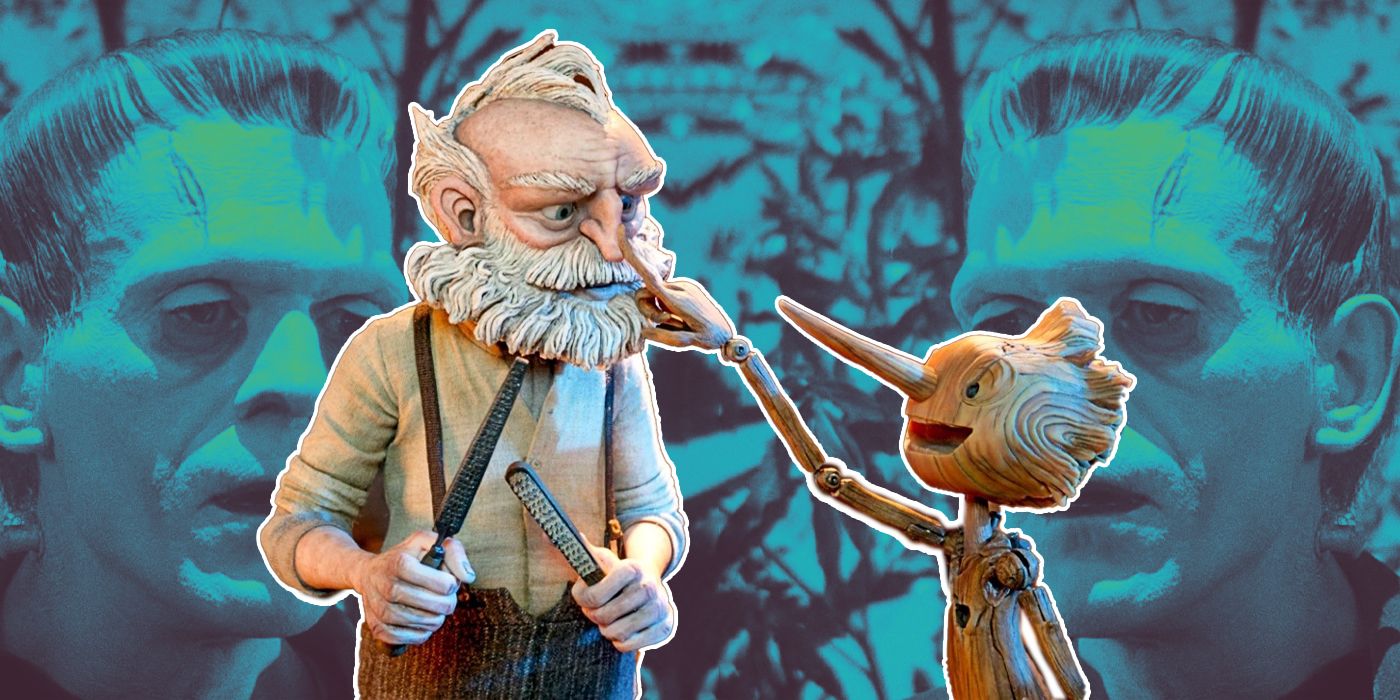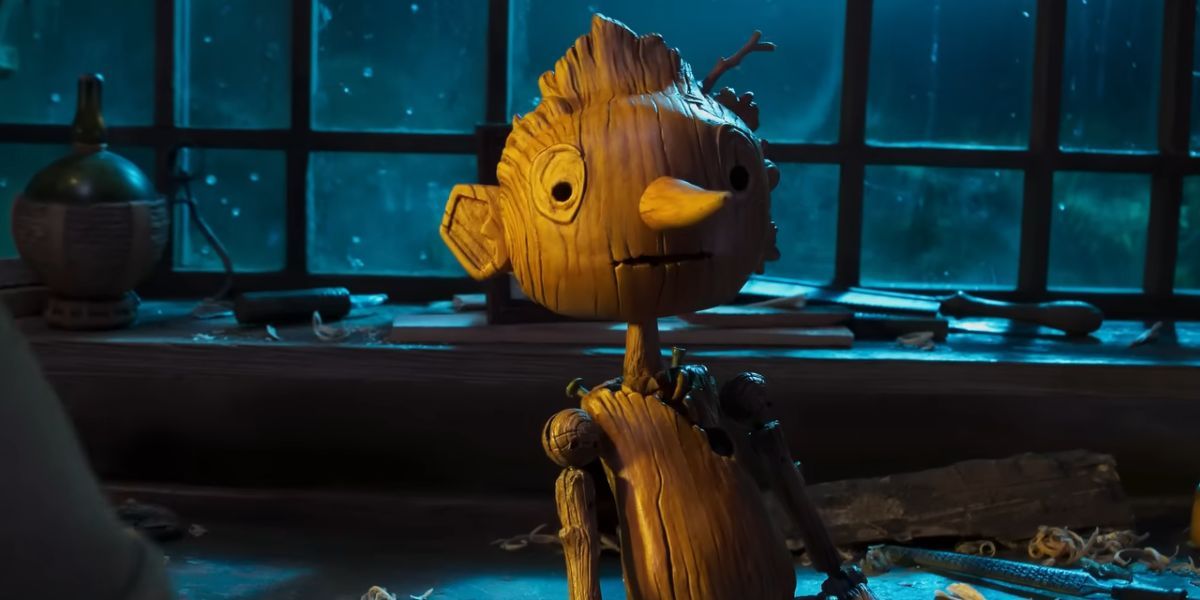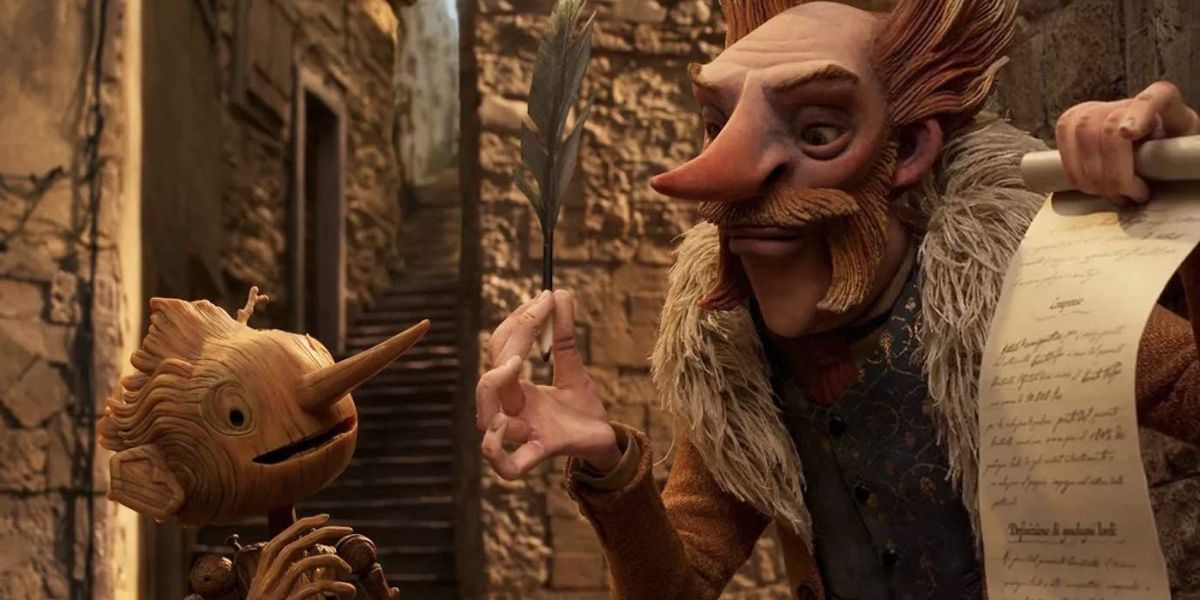Editor's Note: The following contains spoilers for Pinocchio.2022 saw the debut of two absolutely horrifying adaptations of the Pinocchio story (only one was intentional). The first Pinocchio was Robert Zemeckis’ ghastly live-action film starring Tom Hanks, which skipped theaters in favor of an exclusive release on Disney+; while none of Disney’s live-action versions of their animated classics have been particularly strong, Pinocchio is a new low. The other Pinocchio film is intended to make your stomach churn. Guillermo del Toro’s heart-wrenching stop-motion animated film explores the deeper themes of loss, mortality, and fascism within the original story. With an acclaimed debut at the BFI London Film Festival, Guillermo del Toro's Pinocchio has been earmarked as the frontrunner for the Academy Award for Best Animated Feature.
Del Toro Explores the Darker Side of Pinocchio's Story
Del Toro clearly understood that with a story this timeless, context is more important than anything. The original novel, The Adventures of Pinocchio by Carlo Collodi, was written during a civilization on the verge of descending into fascism, and the poor medical services at the time led to widespread diseases and illness. The story itself is essentially a version of Frankenstein with a grieving father; in a desperate attempt to bring his son back to life, Gepetto attempts to “play God” by messing with life and death as we know it. The result is a boy who doesn’t really belong in anyone’s world, and will forever be doomed to replicate someone that has passed on.
Del Toro’s affinity for monster stories is clear, and Pinocchio is as gorgeously designed as any of his “creature features” like The Shape of Water or Pan’s Labyrinth. It’s somewhat odd that the Pinocchio story was ever intended for children; similar to Grimm’s Fairy Tales, the popular conception of the narrative is more closely associated with Disney films, and not the original work. Del Toro embraces the darker implications by wrestling with the ethical dilemma presented in Pinocchio and exploring the psychology of a child whose existence feels like a curse. Both Pinocchio and Frankenstein's monster are victims who will never be accepted as "human;" the difference is that Frankenstein's monster was created out of Victor's arrogance, whereas Pinocchio was created out of Gepetto's love.
'Pinocchio' Shows the Repercussions of Playing God
As anyone who has seen King Kong or Jurassic Park knows, there are elements of nature that humanity does not have the capability to wrestle with. While Victor in Frankenstein makes the mistake of trying to show off the monster, the plight of Gepetto is particularly relatable in Pinocchio. David Bradley’s vocal performance is both heartbreaking and thought-provoking; if he has the means to bring back his child, why should he deny himself the chance to resolve his heartbreak? Unlike Victor, Gepetto doesn't think of himself as a God, because the stakes are more personal.
Similar to Frankenstein, the issue in Del Toro’s Pinocchio isn’t that the titular character (voiced beautifully by Gregory Mann) presents an inherent issue, but that his life clearly isn’t sustainable. Pinocchio is doomed to be mocked and ridiculed if he goes out in public, as he will never be able to relate to other children. It doesn’t take long for Pinocchio’s existence to attract attention from the Italian villagers. Similar to the villagers' fear of Frankenstein's monster, they make the mistake of trying to utilize him for public spectacle, casting him in a touring musical performance.
Of course, it doesn’t take long for Pinocchio’s charms to be taken advantage of by someone with more malicious intentions. Count Volpe (Christoph Waltz) easily tricks the innocent child into signing a contract that will bind him to servitude. Like Frankenstein's monster's interactions with a young girl in the original 1931 film, he’s simply a child whose body itself is viewed as a disturbance. Del Toro does a great job at exploring the body horror aspects of the story; Pinocchio has little control over his own body and fails in his attempts to act normal. The most heartbreaking aspect of the film is that while Gepetto considers his abilities to be “gifts,” Pinocchio learns that they may be curses. Frankenstein's monster makes a similarly heartbreaking revelation when he realizes that he'll be mocked and feared whenever he goes out in public.
The Curse of Immortality
Gepetto wanted his son to live forever, and thus, Pinocchio is doomed to stay the same age for his entire life. Ironically, this sort of personal tragedy is also what motivates Victor in Frankenstein, as he begins pursuing medicine due to his brother's illness.
The end of Del Toro's film delves into what this actually means for a child who is destined to lose every mentor, friend, and teacher that he thought would be there forever; the story beautifully closes as the narrator, Jiminy Cricket (Ewan McGregor), lays to rest. While there’s an optimism to Pinocchio’s attitude going forward, that may just be a result of the innocence that he still has. Gepetto spent his entire life trying to wrestle with his heartbreak, but Pinocchio will be doomed to bear these losses for all eternity. While Pinocchio lacks the ambiguity of Frankenstein's ending, they both indicate that the central characters are destined to live with their creator's sins for the rest of their lives.
The production design in particular helps bring out the Gothic nature of the story that is so quintessential to Frankenstein. Del Toro shows how the joyous villages that had been illuminated in Pinocchio’s early adventures are contorted into haunting symbols of oppression. The show itself that Pinocchio is forced to be a part of isn’t that different from the one in Nightmare Alley; it’s a place where those that are different are forced to serve as entertainment for a jeering audience.
Del Toro has emphatically stated that his love for film began when he first saw James Whale's Frankenstein when he was a child. Perhaps it's odd that Pinocchio ended up turning into his version of a Universal Monster movie, but it’s a surprisingly interesting interpretation that will likely serve as the definitive adaptation. Del Toro acknowledges that monsters exist and he will never stop loving them.
Pinocchio is out now on Netflix.



